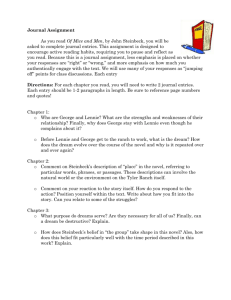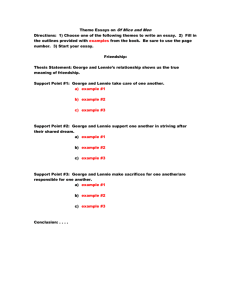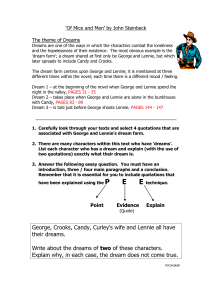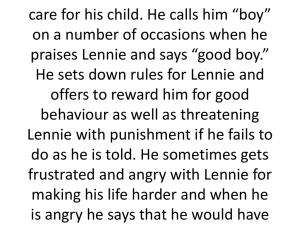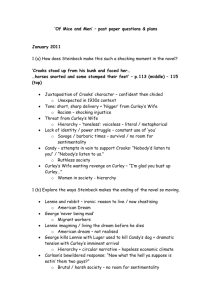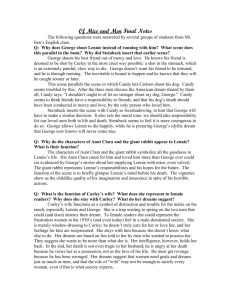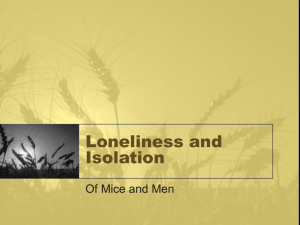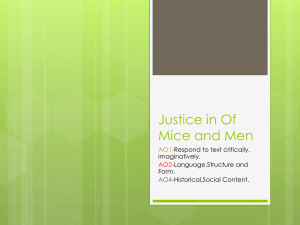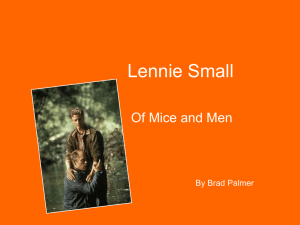Themes in 'Of Mice and Men' -The American Dream -
advertisement
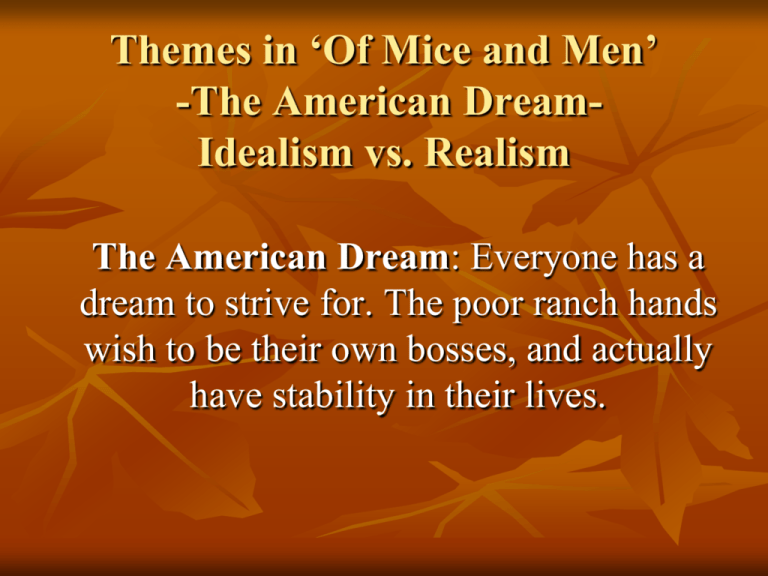
Themes in ‘Of Mice and Men’ -The American DreamIdealism vs. Realism The American Dream: Everyone has a dream to strive for. The poor ranch hands wish to be their own bosses, and actually have stability in their lives. What is the American Dream? The term was first used by James Truslow Adams in his book The Epic of America which was written in 1931. He states: "The American Dream is "that dream of a land in which life should be better and richer and fuller for everyone, with opportunity for each according to ability or achievement. It is not a dream of motor cars and high wages, but a dream of social order in which each man and each woman shall be able to achieve the fullest stature of which they are capable of, and be recognized by others for what they are, regardless of the circumstances of birth or position." Is the American dream possible in the historical context of the novel? "'Well,' said George, 'we'll have a big vegetable patch and a rabbit hutch and chickens. And when it rains in the winter, we'll just say the hell with goin' to work, and we'll build up a fire in the stove and set around it an' listen to the rain comin' down on the roof...'" Their perfect world is one of independence. Workers like Lennie and George have no family, no home, and very little control over their lives. They have to do what the boss tells them and they have little to show for it. They only own what they can carry. Therefore, this idea of having such power over their lives is a strong motivation. George and Lennie have a dream, even before they arrive at their new job on the ranch, to make enough money to live "off the fat of the land" and be their own bosses. Lennie will be permitted, then, to tend the rabbits. Candy, upon hearing about the dream, wanted to join them so that he would not be left alone. Crooks, the Negro outcast, wanted to join them so that he wouldn't be alone. Dreams 2 When Whit brings in the pulp magazine with the letter written by Bill Tenner, the men are all very impressed. They are not certain that Bill wrote the letter, but Whit is convinced he did, and tries to convince the others. In the transient life of these workers, it is rare to leave any kind of permanent mark on the world. In this letter Bill Tenner has achieved some of the immortality the other men cannot imagine for themselves. Dreams 3 When George goes into a full description of the dream farm, its Eden-like qualities become even more apparent. All the food they want will be right there, with minimal effort. As Lennie says: "We could live offa the fatta the lan'." Chapter 3, pg. 57. When George talks about their farm, he twice describes it in terms of things he loved in childhood: "I could build a smoke house like the one gran'pa had..." Chapter 3, pg. 57. George yearns for his future to reflect the beauty of his childhood. "An' we'd keep a few pigeons to go flyin' around the win'mill like they done when I was a kid." Dreams 4 The ideal world presented by Crooks also reflects childhood. His father had a chicken ranch full of white chickens, a berry patch, and alfalfa. He and his brothers would sit and watch the chickens. Companionship and plentiful food are both parts of Crooks' dream. Dreams 5 Curley's wife has a dream that although different in detail from the other's dreams, is still very similar in its general desires. She wants companionship so much that she will try to talk to people who don't want to talk to her, like all the men on the ranch. Unsatisfied by her surly husband, she constantly lurks around the barn, trying to engage the workers in conversation. The second part of her dream parallels the men's desire for their own land. She wanted to be an actress in Hollywood. She imagines how great it would be to stay in nice hotels, own lots of beautiful clothes, and have people want to take her photograph. Both attention and financial security would have been hers. Like the men she desires friendship, and also material comforts, though the specifics of her dream differ from theirs. Dreams 6 When George tells Lennie to look across the river and imagine their farm, he lets Lennie die with the hope that they will attain their dream, and attain it soon. George, however, is not allowed such comfort. He must go on living knowing the failure of their dream, as well as deal with the guilt of tragically losing his best friend. The Futility of the American Dream (*In the context of the novel!!) George and Lennie’s dream of owning a farm, which would enable them to sustain themselves, and, most important, offer them protection from an inhospitable world, represents a prototypically American ideal. Their journey, which awakens George to the impossibility of this dream, sadly proves that the bitter Crooks is right: such paradises of freedom, contentment, and safety are not to be found in this* world. Is the American dream possible in the historical context of the novel? Dreams Dreams are one of the ways in which the characters combat the loneliness and hopelessness of their existence. The most obvious example is the dream farm, a dream shared at first only by George and Lennie, but which later spreads to include Candy and Crooks. Crooks reveals that it is the favourite dream of the itinerant ranch hands: 'Seems like ever' guy got land in his head.' It is a powerful dream, however, and even the cynical Crooks falls under its spell for a short time. To Lennie, the dream is an antidote to disappointment and loneliness, and he often asks George to recite the description of the farm to him. Curley's wife is another who has dreams, her fantasies of a part in the movies and a life of luxury. Part of her dissatisfaction with her life is that it can never measure up to her dreams. Significantly, none of the characters ever achieve their dreams. Other Themes: Class Conflict Although George and Lennie have their dream, they are not in a position to attain it. In addition to their own personal limitations, they are also limited by their position in society. Their idealistic dream is eventually destroyed by an unfeeling, materialistic, modern society. The tensions between the characters are inherent in the nature of American capitalism and its class system. Lennie's mental retardation also symbolizes the helplessness of people in a capitalistic, commercial, competitive society. In this way, Steinbeck illustrates the confusion and hopelessness of the Depression era. The poor were a class of people who suddenly had captured the imagination of American writers in the 1930s. This was an example of the shift in attitudes that occurred during the Depression. Previously, American fiction had been concerned with the problems of middle-class people. Steinbeck's novel was a sympathetic portrayal of the lives of the poorest class of working people, while exposing society's injustices and economic inequalities in the hope of improving their situation. Other Themes: Loneliness & Isolation Of Mice and Men teaches a grim lesson about the nature of human existence. Nearly all of the characters, including George, Lennie, Candy, Crooks, and Curley’s wife, admit, at one time or another, to having a profound sense of loneliness and isolation. Each desires the comfort of a friend, but will settle for the attentive ear of a stranger. Curley’s wife admits to Candy, Crooks, and Lennie that she is unhappily married, and Crooks tells Lennie that life is no good without a companion to turn to in times of confusion and need. The characters are rendered helpless by their isolation, and yet, even at their weakest, they seek to destroy those who are even weaker than they. Perhaps the most powerful example of this cruel tendency is when Crooks criticizes Lennie’s dream of the farm and his dependence on George. Having just admitted his own vulnerabilities—he is a black man with a crooked back who longs for companionship—Crooks zeroes in on Lennie’s own weaknesses. Other Themes: Race & Racism Somewhat related to the theme of loneliness is racism, which also results in personal isolation. Crooks, the old black man on the ranch, lives alone, ostracized by the ranch hands because of his race. The barrier of racial prejudice is briefly broken, however, when Crooks becomes an ally in the dream to buy a farm. Crooks has a bitter dignity and honesty that illustrate Steinbeck's own criticism of American society's failures in the Depression era of the 1930s. Other Themes: Mental Limitations Lennie's mental limitations also serve to illustrate another way in which people separate themselves from one another. Because of his handicap, Lennie is rejected by everyone at the ranch except George. The ranch hands are suspicious of Lennie and fear him when they recognize his physical strength and his inability to control himsef. Steinbeck makes it clear that it is the malice, fear, and anger in other people that are to blame for Lennie's violent actions. Steinbeck's portrayal of Lennie's handicap is therefore completely sympathetic; the other characters have only themselves to blame for provoking Lennie, who is merely a child in a world of selfish adults. That Lennie has to die at the novel's conclusion is a poignant commentary on the inability of the innocent to survive in modern society. Other Themes: Broken Plans Of Mice and Men takes its title from a famous lyric by the Scottish poet Robert Burns (1759-1796). Burns’s poem “To a Mouse” contains the lines, “The best laid plans of mice and men / Often go awry.” Nearly all of the main characters Of Mice and Men harbor dreams and plans that never come true. Most notably, George, Lennie, and Candy share a doomed dream of buying their own farm and living off the land. George often laments the life he could have had as a freewheeling bachelor, free of the burden of caring for Lennie. “[I]f I was alone I could live so easy,” he says. Lennie has his own private dream of living in a cave with his own rabbits, while Curley’s wife often regrets her missed chance to become a Hollywood actress. In the end, the novel’s main theme is that people must learn to reconcile their dreams with reality, to accept that everyone’s best laid plans often perish. These plans “go awry” not because the characters in the novella give up on them, but because forces beyond their control destroy them. In the bleak economic outlook of the Great Depression, during which the novel was written and set, coming to terms with dreams broken by out-of-control economic forces became a reality nearly everyone in America faced. Other Themes: Male Friendship Of Mice and Men explores the dynamics of male friendship. When Lennie asks George to tell him why they’re not like other ranchers, George explains that they’re different because they have each other. Usually ranchers have no family, no friends, and, therefore, no future. George and Lennie’s friendship strikes the other ranch workers as odd: their dependence on each other makes the boss and Curley suspicious; and Slim observes that ranch workers rarely travel together because they’re scared of each other. Although most of the men in the novel are entirely alone, they all crave true companionship. As Crooks, perhaps the novel’s most solitary character because of his black skin, puts it, “A guy needs somebody—to be near him.” Other Themes: The Weak and the Strong Though many characters in Of Mice and Men long for friendship and compassion, they live in fear of each other. As Carlson’s unsentimental shooting of Candy’s dog makes clear, in the Great Depression the useless, old, or weak were inevitably destroyed as the strong and useful fought for survival. Everyone on the ranch constantly tries to look strong, especially if they feel weak. The fear of the weak being overrun by the strong explains why Curley likes to fight larger men, why Crooks tells Lennie that George is going to abandon him, and why Curley’s wife threatens to have Crooks lynched. Each character tries to appear strong by asserting power over another. The fear of the strong also explains why most of the other characters in Of Mice and Men can’t comprehend Lennie and George’s friendship. A human relationship devoid of power dynamics simply makes no sense to the other characters, all of whom assume they’re in a fight for survival. Other Themes: Loyalty George is steadfastly loyal throughout the novel, honoring his commitment to take care of the retarded Lennie. George, with all his personal limitations, is a man who has committed himself in a compassionate relationship. The grief he feels over the tragic ending of Lennie’s life is also evidence of George's essential decency. Although the dream perishes, the theme of commitment achieves its strongest point in the novel's conclusion. Unlike Candy, who earlier abandoned responsibility for his old dog and allows Carlson to shoot the animal, George remains his brother's keeper. In his acceptance of complete responsibility for Lennie, George demonstrates the commitment necessary to join the ranks of Steinbeck's heroes. Other Themes: Women There are two different visions of women in Of Mice and Men: the male characters’ view of women, and the novel’s view of women. The men tend to view women with scorn and fear, dismissing women as dangerous sexual temptresses. Women are often referred to as “tarts,” a derogatory word for women that means “tramp.” Lennie and George have a mutual friend in prison “on account of a tart,” and their own troubles result twice from the enticing allure of a woman—the woman in Weed, and Curley’s wife. Yet although Curley’s wife plays into her role as sexy temptress, Of Mice and Men presents her, at least partly, as a victim. She craves the attention of the men because she’s desperately lonely, and flaunts her power over the men because she herself feels weak. Similarly, the novella’s portrayal of Aunt Clara as a vision of wholesome femininity from a more innocent age contrasts with the male characters’ consistently negative view of women. Credits: This powerpoint was kindly donated to www.worldofteaching.com With contributions found at the following sites: http://www.answers.com/topic/of-mice-and-men-novel-3 http://www.sparknotes.com/lit/micemen/themes.html http://www.worldofteaching.com is home to over a thousand powerpoints submitted by teachers. This is a completely free site and requires no registration. Please visit and I hope it will help in your teaching.
